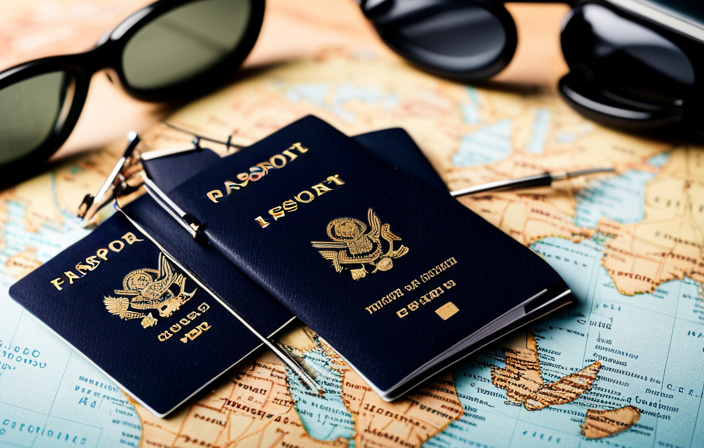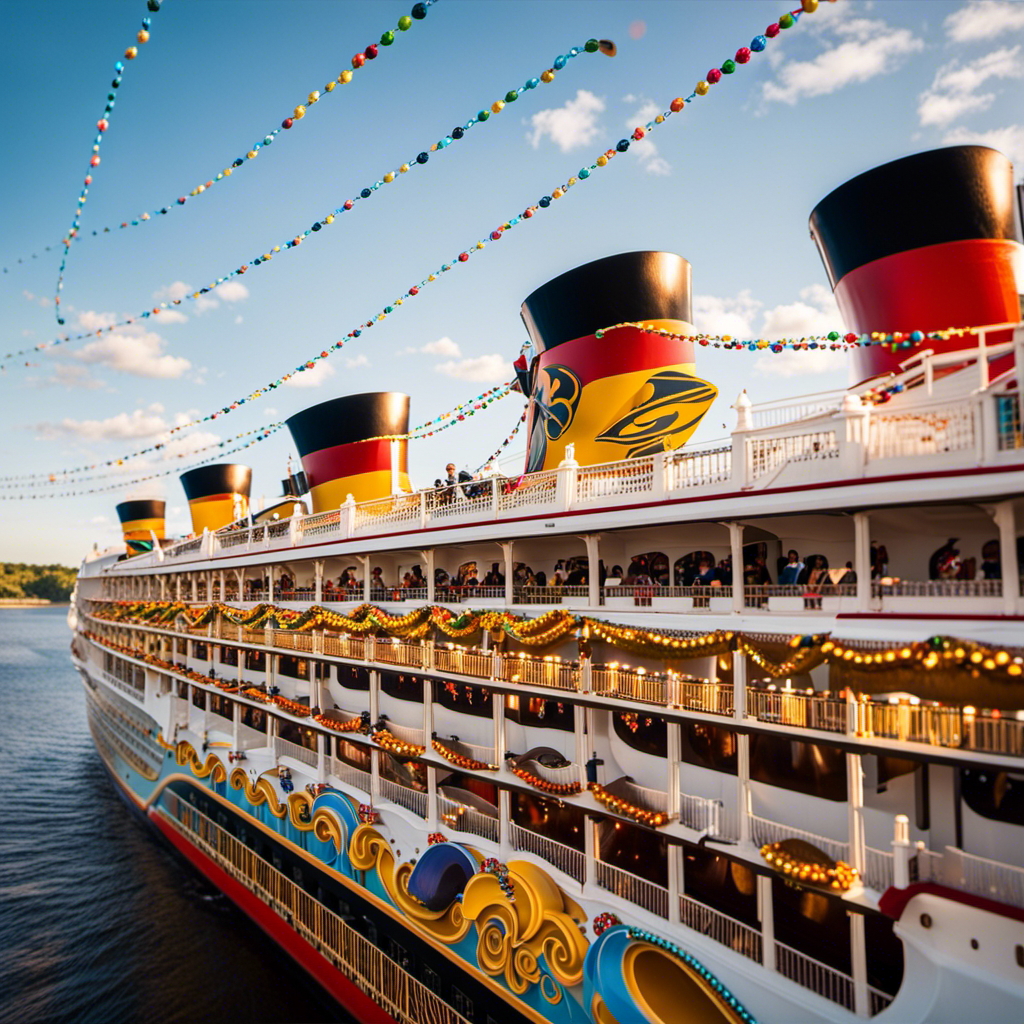As I embarked on my first cruise, I quickly realized the importance of having all essential documents well-organized.
Picture this: you’re standing at the port, excitement coursing through your veins, but suddenly, you’re told you can’t board because you don’t have the necessary paperwork.
Don’t let this scenario become your reality. In this article, I will guide you through the essential documents you need for a cruise, ensuring smooth sailing from start to finish.
Key Takeaways
- Passport must be valid for at least six months before the cruise.
- Visa application process varies based on country and nationality.
- Ensure passport is valid for at least six months beyond the intended date of departure.
- Bring a valid passport or birth certificate as proof of citizenship.
Passport Requirements
You’ll need to make sure your passport is valid for at least six months before your cruise. Passport expiration is one of the most important entry requirements for a cruise. Many countries require that your passport be valid for a certain period beyond the end of your trip. This is to ensure that you have a valid travel document for the duration of your stay.
Before embarking on your cruise, check the expiration date of your passport and renew it if necessary. It’s also a good idea to make copies of your passport and keep them in a separate place, in case it gets lost or stolen during your trip.
Now that you have taken care of the passport requirements, let’s move on to the next important document: visa requirements.
Visa Requirements
When it comes to visa requirements, there are a few key points to consider.
First, the visa application process can vary depending on the country you are visiting and your own nationality. It’s important to research and prepare all the necessary documents before applying.
Second, the required travel documentation for a visa application typically includes a valid passport, completed application forms, passport-sized photos, and proof of financial stability.
Finally, it’s important to be aware of any exemptions or restrictions that may apply to your visa application, such as age limits or specific travel purposes.
Being knowledgeable about these key points will help ensure a smooth and successful visa application process.
Visa Application Process
To apply for a visa, make sure you have all the necessary documents ready. The visa application process can be quite complex, so it’s important to be well-prepared. Here are some key items to keep in mind:
-
Valid passport: Ensure that your passport is valid for at least six months beyond your intended stay.
-
Completed visa application form: Fill out the form accurately and honestly.
-
Passport-sized photographs: Provide recent, clear, and color photographs.
-
Proof of travel insurance: Many countries require visitors to have travel insurance that covers medical expenses.
-
Financial documents: Show proof of sufficient funds to cover your travel expenses.
These documents are essential to successfully complete the visa application process. Once you have obtained your visa, it’s time to move on to the next step: gathering the required travel documentation.
Required Travel Documentation
Once you’ve obtained your visa, it’s important to gather all the required travel documentation.
First and foremost, ensure that your passport is valid for at least six months beyond your intended date of departure. If your passport is nearing expiration, consider initiating the passport renewal process well in advance.
Additionally, it’s crucial to check the immunization requirements for your destination. Some countries may require specific vaccinations to enter, so make sure to consult with your healthcare provider or visit the Centers for Disease Control and Prevention (CDC) website for the latest information.
These travel documents, including your valid passport and any necessary immunization records, will ensure a smooth and hassle-free journey.
Now, let’s explore the exemptions and restrictions that may apply to your cruise.
Exemptions and Restrictions
Before setting sail, it’s important to be aware of any exemptions and restrictions that may apply to your upcoming journey. Understanding the cruise line policies and regulations can help ensure a smooth and hassle-free experience. Here are three key points to keep in mind:
-
Age limitations: Some cruise lines have age restrictions for certain destinations or activities onboard. For example, children may not be allowed in certain adult-only areas or there may be age limits for certain shore excursions.
-
Medical conditions: If you have any medical conditions or disabilities, it’s crucial to check with the cruise line beforehand to ensure they can accommodate your needs. Some conditions may require additional documentation or medical clearances.
-
Restricted items: Cruise lines have specific rules regarding items that are not allowed onboard. These may include weapons, illegal drugs, or certain types of food or beverages.
Now that you’re aware of the exemptions and restrictions, let’s move on to the next important aspect: proof of citizenship.
Proof of Citizenship
You’ll need to bring a valid passport or birth certificate as proof of citizenship for your cruise. It’s important to ensure that your passport is valid for at least six months beyond the end of your cruise. This requirement is in place to ensure that you have ample time to return to your home country should any unforeseen circumstances arise during your trip. If you choose to use a birth certificate as proof of citizenship, it must be accompanied by a government-issued photo ID, such as a driver’s license. This helps to verify your identity and ensure a smooth boarding process. Here is a helpful table summarizing the required documents for different citizenships:
| Citizenship | Passport Validity | Additional Documents Required |
|---|---|---|
| US | 6 months | None |
| UK | 6 months | None |
| Canada | 6 months | None |
| Australia | 6 months | None |
Now that you know what documents are needed to prove your citizenship, let’s move on to the next section about identification documents.
Identification Documents
When it comes to traveling, it’s important to have the right identification documents in order to proceed smoothly.
In this discussion, we will explore the accepted forms of identification and the necessary travel documents one must possess.
From driver’s licenses and passports to visas and permits, understanding the requirements will ensure a hassle-free journey.
Accepted ID Forms
Accepted ID forms for a cruise typically include a valid passport or a state-issued driver’s license. It is essential to ensure that your passport is valid for at least six months beyond the duration of your cruise. Some countries have specific passport validity requirements, so it is crucial to check the passport validity guidelines for your specific itinerary. Additionally, certain destinations may have travel restrictions in place, such as visa requirements or entry permits. It is advisable to research and be aware of any travel restrictions before embarking on your cruise to avoid any last-minute complications. In the table below, you can find a simplified overview of the accepted ID forms for cruises:
| Accepted ID Forms |
|---|
| Valid Passport |
| State-Issued Driver’s License |
| Other Government-Issued ID (varies by cruise line) |
As you prepare for your cruise adventure, it is important to gather all necessary travel documents to ensure a smooth and hassle-free experience.
Necessary Travel Documents
Now that we know which forms of identification are accepted for cruises, let’s discuss the necessary travel documents.
One important thing to note is passport validity. Ensure that your passport is valid for at least six months beyond the end of your cruise. This is crucial, as some countries require a certain period of validity before allowing entry.
It’s also a good idea to make copies of your passport and store them separately from the original. In case of loss or theft, these copies can help expedite the replacement process.
Additionally, consider using a travel document storage system, such as a waterproof pouch or a secure digital storage app. These methods can help keep your travel documents safe and easily accessible throughout your trip.
Speaking of safety, another important aspect to consider is travel insurance…
Transition to the subsequent section about ‘travel insurance’:
Speaking of safety, another important aspect to consider is travel insurance.
Travel Insurance
You’ll want to make sure you have travel insurance before going on a cruise. Not only does travel insurance provide peace of mind, but it also offers essential medical coverage in case of any unforeseen emergencies.
Here are three reasons why having travel insurance is crucial for your cruise:
-
Medical Coverage: Travel insurance ensures that you are protected in case of illness or injury during your cruise. It covers medical expenses, emergency medical evacuation, and even repatriation in extreme cases.
-
Trip Cancellation/Interruption: If your trip gets canceled or cut short due to unforeseen circumstances like illness, family emergencies, or natural disasters, travel insurance can reimburse you for the non-refundable expenses and help you with rescheduling.
-
Lost or Delayed Baggage: Travel insurance can provide coverage for lost or delayed baggage, ensuring that you are compensated for the inconvenience caused.
Having travel insurance gives you the peace of mind to enjoy your cruise without worrying about unexpected medical expenses or other travel mishaps. Once you have your travel insurance sorted, the next important document you’ll need is your cruise line boarding pass.
Cruise Line Boarding Pass
Once you’ve obtained your boarding pass from the cruise line, it’s important to keep it in a safe and easily accessible place throughout your trip. The cruise line check-in process typically requires you to present your boarding pass along with other necessary documents before boarding the ship.
To make the check-in process smoother, many cruise lines now offer online check-in options. This allows you to complete the required paperwork and provide necessary information in advance, saving you time at the terminal. Online check-in also gives you the opportunity to choose your preferred dining options, activities, and even book shore excursions in advance. This way, you can maximize your time and enjoy your cruise to the fullest.
Now, let’s move on to an equally important aspect of cruise travel – medical documents.
Medical Documents
To ensure a smooth and hassle-free cruise experience, it’s essential to bring along your medical documents. Here are the medical forms and vaccination records you should have with you:
-
Medical History Form: This form provides important information about your health conditions, allergies, and medications.
-
Emergency Contact Form: It’s crucial to provide contact details of a person who can be reached in case of an emergency.
-
Vaccination Records: Some cruise lines require proof of certain vaccinations, such as the flu or COVID-19 vaccine.
-
Insurance Information: Carry your health insurance card and any relevant policy documents.
Having these documents ready will ensure that you have the necessary information in case of any medical emergencies during your cruise.
Now, let’s move on to the next important document: credit card authorization forms, which are essential for onboard purchases and transactions.
Credit Card Authorization Forms
When it comes to credit card authorization forms, there are three key points to consider: required payment methods, security, and liability.
First, it is important to understand what payment methods are accepted and required by the company or organization requesting the authorization. This could include credit cards, debit cards, or even electronic payment methods like PayPal.
Second, security is a crucial aspect to consider, as it ensures that your personal and financial information remains protected during the authorization process.
Finally, liability is an important consideration, as it determines who is responsible for any potential fraudulent charges or unauthorized transactions made using your authorized credit card.
Required Payment Methods
Accepted payment methods for a cruise typically include credit cards, debit cards, and electronic transfers. When it comes to payment options, cruise lines strive to provide convenience and flexibility for their passengers.
Most major credit cards, such as Visa, Mastercard, and American Express, are widely accepted. Debit cards linked to a bank account can also be used for payment. Additionally, electronic transfers are becoming increasingly popular, allowing passengers to transfer funds directly from their bank accounts to the cruise line.
It is important to familiarize yourself with the payment policies of the specific cruise line you are booking with, as they may have certain restrictions or requirements.
Now, let’s move on to the next section, where we will discuss the important aspects of security and liability during your cruise experience.
Security and Liability
After discussing the required payment methods for a cruise, let’s move on to the important topic of security and liability. When it comes to going on a cruise, it’s crucial to ensure that you have adequate liability coverage and that the cruise line has implemented proper security measures. Here are some key points to consider:
-
Liability coverage: Make sure you have travel insurance that includes liability coverage. This will protect you in case of any accidents or incidents that may occur on the cruise.
-
Security measures: Look into the security measures implemented by the cruise line. This may include surveillance cameras, security personnel, and safety protocols to ensure your well-being onboard.
-
Emergency procedures: Familiarize yourself with the emergency procedures on the cruise ship. This includes knowing the location of emergency exits, life jackets, and evacuation plans.
-
Personal safety precautions: Take personal safety precautions such as locking your cabin door, keeping your valuables secure, and being aware of your surroundings.
-
Reporting incidents: In the unfortunate event of an incident, promptly report it to the ship’s authorities and follow their instructions.
Now, let’s move on to the next section where we’ll discuss the importance of parental consent forms.
Parental Consent Forms
You’ll need to bring parental consent forms for any minors traveling without a parent or guardian. Parental consent requirements vary depending on the cruise line, but generally, anyone under the age of 18 will need to provide a signed consent form from their parent or legal guardian. Some cruise lines may also require additional documentation, such as a copy of the child’s birth certificate or passport.
It’s important to check the specific requirements of the cruise line you are traveling with to ensure you have all the necessary documents. Age restrictions may also apply for certain activities or areas on the ship, so it’s important to be aware of any limitations for minors.
Now, let’s move on to special accommodation requests for your cruise experience.
Special Accommodation Requests
If you have any special accommodation requests, such as dietary restrictions or accessibility needs, it’s important to inform the cruise line in advance. This ensures that they can make necessary arrangements to accommodate your needs during the cruise.
One common special accommodation request is for special dietary requests. Many cruise lines offer a variety of options for passengers with dietary restrictions, such as vegetarian, gluten-free, or kosher meals. By notifying the cruise line in advance, they can make sure that these meals are prepared and available for you throughout your trip.
Another important accommodation request to consider is accessible cabins. These cabins are designed to provide ease of access for individuals with mobility impairments. They typically come equipped with features such as wider doorways, grab bars, and wheelchair-accessible bathrooms. By informing the cruise line in advance, they can reserve an accessible cabin for you, ensuring that your accommodation meets your accessibility needs.
Frequently Asked Questions
Are There Any Age Restrictions for Boarding a Cruise Ship?
Age restrictions for boarding a cruise ship vary depending on the cruise line. Some may require passengers to be at least 21 years old to book a cabin, while others allow passengers as young as 18. It’s important to check with the specific cruise line for their age requirements.
Can I Bring My Pet on a Cruise?
Yes, you can bring your pet on a cruise. Many cruise lines have pet accommodations and pet policies in place to ensure a comfortable and safe experience for both you and your furry friend.
Do I Need to Provide a Negative COVID-19 Test Result Before Boarding a Cruise Ship?
Before boarding a cruise ship, I need to provide a negative COVID-19 test result and proof of vaccination. It’s important to ensure the safety of all passengers and crew members during these challenging times.
What Documents Do I Need if I Am Traveling With a Minor Who Is Not My Child?
When traveling with a minor who is not my child, there are consent requirements and legal documentation needed. It’s important to have the proper authorization and proof of relationship to ensure a smooth and hassle-free trip.
Is There a Limit on the Amount of Cash I Can Carry on Board?
Onboard, there’s a treasure trove of experiences awaiting you. But remember, matey, customs regulations be in place. So, keep in mind that there may be a limit on the amount of cash ye can carry on board.
Conclusion
In conclusion, going on a cruise requires a fair bit of preparation and documentation. From passport and visa requirements to proof of citizenship and identification documents, it’s important to have all your paperwork in order.
Don’t forget about travel insurance and any necessary medical documents as well. And if you’re traveling with kids, parental consent forms are a must.
Lastly, if you have any special accommodation requests, make sure to communicate them in advance.
So, get ready to set sail and have a blast on your cruise adventure! Bon voyage!
Claire, a creative soul with an unquenchable thirst for storytelling, is an integral part of the Voyager Info team. As a dedicated writer, she weaves captivating narratives that transport readers to enchanting cruise destinations and beyond.
Claire’s love affair with writing began at an early age when she discovered the magic of words and their ability to craft worlds and emotions. Her innate curiosity led her to explore various literary genres, but it was travel writing that truly captured her heart. Drawing inspiration from her own globetrotting adventures and encounters with diverse cultures, Claire embarked on a journey to become a travel writer par excellence.











